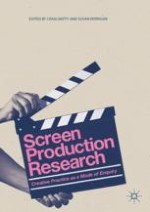2018 | OriginalPaper | Buchkapitel
3. Lights, Camera, Research: The Specificity of Research in Screen Production
verfasst von : Leo Berkeley
Erschienen in: Screen Production Research
Aktivieren Sie unsere intelligente Suche, um passende Fachinhalte oder Patente zu finden.
Wählen Sie Textabschnitte aus um mit Künstlicher Intelligenz passenden Patente zu finden. powered by
Markieren Sie Textabschnitte, um KI-gestützt weitere passende Inhalte zu finden. powered by
